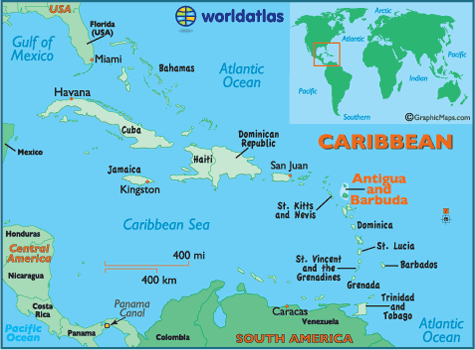Caribbean Hurricane Season
June 1st to November 30th Annually
Caribbean Hurricane Season begins June 1st and ends November 30th annually.
For 2014 21 named storms have been forecasted for the Atlantic Basin.
In Jamaica, apart from a few overcast days at the beginning of June, summer is warming up nicely.
Caribbean Region-Courtesy of World Atlas

Caribbean Hurricane Season - 21 named Storms for 2014
In these early stages the main focus on hurricane season in Jamaica is preparedness and while we have 21 named storms for 2014, the ones of concern will be those likely to make landfall.
Read more on Jamaica's hurrican preparedness and magement at www.odpem.org.jm
Caribbean Hurricane Season - Terms you should know:
|
|
Most Caribbean hurricanes are more likely to occur between August and October, however they may occur at other times.
Things to do Before the Hurricane Season
|
|
Caribbean Hurricane Season preparedness kit
Your preparedness kit should include:
|
|
Should you stay or leave?
You will need to decide before the storm arrives whether it is safe for you to stay at home or if you should evacuate.
Important
It is wise to evacuate if you live in any of these areas:
- The coastline
- Beside a river or gully
- In flood plains
Caribbean Hurricane Season - A Hurricane Watch
If you are advised to be on a Hurricane Watch, this means that the hurricane could pose a threat to your area within 36 hours.
At this time you will become pro active and begin to take any precautions that will require more than 18/24 hours to fulfil.
Prepare for the Storm
The check list below will help you to prepare and will vary according to your circumstances. Prepare your home and stock up on the following:
|
|
Caribbean Hurricane Season - Hurricane Warning
A hurricane warning means the storm is expected to hit within 24 hours. If this is declared by the relevant authorities, you will need to ensure the following:
|
|
Caribbean Hurricane Season - During the Hurricane
During the Hurricane or Storm, the following recommendations should be adhered to:
|
|
Caribbean Hurricane Season - After the Hurricane
Caribbean Hurricane Season - Wait until you hear on the radio or TV that the dangerous winds are definitely out of your area before venturing outside.
Some precautions to take:
- Seek medical aid at first aid stations, hospitals or clinics for persons injured in the hurricane.
- Beware of outdoor hazards such as downed power lines, weakened bridges and washed out roads, weakened tree limbs or trees.
- Never touch a fallen power line or try to move it. If the line still has power you could be electrocuted.
- Do not empty stored water and boil all drinking water until you are advised that a safe supply has been restored.
- Use dry or canned foods.
- Be alert to prevent fires. Do not use candles or burn debris.
- Be sure to check your house for structural damage before moving back
- Get certified electrician to check and repair electrical damage to your house
- Do not walk outside barefooted
- Avoid wearing open shoes
- Watch out for broken glass or sharp debris
- Report broken sewer or water mains to local authorities
- Offer help to other members of your community who might have been affected
The above information is given courtesy of the Office of Disaster Preparedness and Emergency Management, www.odpem.org.jm
Return from Caribbean hurricane season to Jamaica Imformation
Return from Caribbean hurricane season to Jamaica Vacations
My Jamaica Blog keeps you up to date with news and reviews of the Best of Jamaica please subscribe below. Thanks, see you again soon.


New! Comments
Have your say about what you just read! Leave me a comment in the box below.